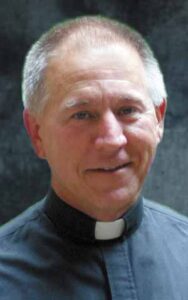Fr. Bud Grant
Back to the Garden

The return of global ultra-nationalism is the most disturbing social trend in recent memory. It is behind the so-called “Brexit.” It is gaining power from Australia to Austria. Russia and Hungary are already governed by it. Shoot, it could even happen here…again. The term evokes World War II Germany or Cold War Soviet Union: caldrons of xenophobia, racism, isolationism and jingoism. This usually doesn’t work out so well for immigrants, minorities or foreigners, which is to say the ancestors of most American Catholics. Its opposites include tolerance, peace, open mindedness and patriotism.
Typically, a bad economy fuels right-wing nationalism. Even though the U.S. economy is growing, the concomitant wealth and opportunity are not distributed evenly. People are justifiably angry. It is odd that this anger should target those who are even poorer, with less opportunity, and more vulnerable … odd and (it should go without saying) profoundly un-Christian. The economics of ultra-nationalism are based on the premise that there is not enough to go around, that we should hoard what we have (like jobs and resources), keep out those who want a piece of it (with walls, deportations, bans and interments) and it is all good if we can wrest more from the hands of others (with aggression and threats of aggression). The politics of exclusion become the economics of acquisition.
There is an environmental corollary to this. Walls, for example, are a bad idea. Migrations of species other than humans rely on the ability to move across political borders. Sequestering resources also runs contrary to ecological wisdom … the whole system tends to thrive better when even the meanest and lowest species get their share, as we learned when, to our horror, we discovered that pesticides are destroying pollinators.
Political exclusivity and economic acquisitiveness are environmentally counterproductive. We have entered the anthropocene epoch, meaning that human activities are now the dominant influence on the global environment. Thus, we have a profound responsibility for the planet. This cannot be done within the parameters of nationalistic parapets. The planet can only be saved through inclusivity, openness and, yes — fearful though this ideologically fraught word has become — globalism. A global crisis requires a global response.
This is not the time to contract within political borders, huddle inside ethnically cleansed enclaves and lash out in fear-driven aggression. As tempting as it may be to coil inside the safety-promising cocoon of nationalism, such jingoism is neither just nor expedient.
In his masterpiece of moral theology, St. Ambrose of Milan distinguishes between what is “expedient” and what is “virtuous.” He defines expediency as that which is “useful,” meaning what is practical … what will, to borrow a great phrase from rural Iowa, “get ‘er done;” where “er” has to do with the acquisition of “the conveniences of life, with wealth, resources and opportunities.” Then he defines virtue as having to do with “moral dignity and integrity of life” (de Off. I. 27). The question, then: in difficult and dangerous times, can we afford to be magnanimous or should we take care of our own needs first? (Thomas Aquinas’ age — the twilight of the Roman Empire — was far more dangerous and difficult than what most anyone outside of Fallujah or Aleppo could appreciate).
Ambrose says that the expedient cannot contradict the virtuous, since the only really useful act is that which increases virtue. “We do not reckon usefulness by the value of money, but in acquiring godliness … I am speaking of the duties which I wish to impress upon and impart to you …” (de Off. II.23, 25). Environmentally speaking “moral dignity” doesn’t just trump “the conveniences of life.” Rather, all of one’s wealth, resources and opportunities should be lent to the duty to serve that “integrity of life.”
We live in an economically, ecologically, and ethically integrated world that is in an advanced state of crisis. This is no time to build walls but, as Pope Francis admonishes, to build bridges.
(Father Bud Grant is a professor of theology at St. Ambrose University in Davenport.)










